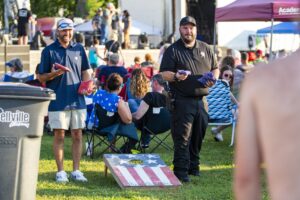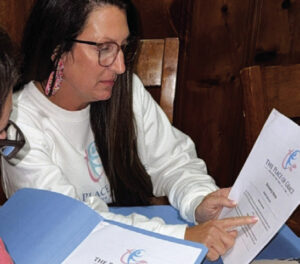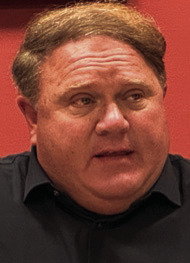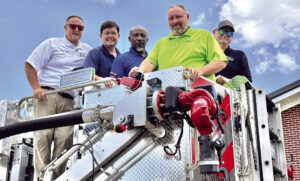In my own words… Do we have Grand Juries or Grand Jokes?
By Staff
June 24, 2001
Though it may come as a surprise to those who have served on or observed the Grand Jury, the general duty of a Grand Jury is to guard the rights and liberties of the people by protecting them against unfounded criminal prosecutions, according to the Supreme Court of the United States.
Historically, the Grand Jury originally protected the people from public officials in addition to protecting the citizens from unfounded criminal prosecutions. One major function of the Grand Jury has been to protect the people from corruption in government. Grand Juries at one time, particularly in England, were powerful, and even today in some metropolitan areas, Grand Juries are powerful.
However, before the Jury Commission Act was passed in 1975, the actions of most Mississippi Grand Juries were syncopated by politicians to protect them while stealing and committing malfeasance in office.
Too close to officials
Grand Juries were chosen by the Board of Supervisors, the governing body of the county. In one four-year period, Lauderdale County empaneled 160 grand jurors for 8 sessions, but only 52 different people appeared during the entire four years. Forty percent of those were relatives or employees of the Board of Supervisors.
It may also come as a surprise to learn that the Grand Jury has significant power enough to exercise independence. But they are never given the opportunity to realize this. Our system summons them, brings them before the Court for a verbal charge (instructions), and rushes them through indictments and inspections, much like a salesman selling timeshare condos.
The only way they might understand their powers and duties is if they are able to remember everything the Judge tells them in some 15 to 20 minutes in his charge. We shouldn't expect that of anyone.
This is no criticism of Grand Jurors. Most of them are conscientious and want to do their duty. The problem is that the system doesn't allow them to even find out what their duties and powers are.
Unfortunately, it appears they are guided into doing almost the opposite of what the U. S. Supreme Court said. The Grand Jury sessions are under the total control of the District Attorney's Office. Some State Supreme Court Judges justify this because the District Attorney and law enforcement officers hold public positions.
However, Judge Jimmy Robertson of the Mississippi Supreme Court said this: "The suggestion that advocacy by the District Attorney and law enforcement is somehow legitimate by reason of the official position and responsibility of the advocate is absurd on its face."
Too great a rush
Officials refer to the Grand Jury's "deliberating." If they really deliberate, and if they do try to protect the innocent, how is it that in 1999 they considered 1,434 cases in 3 sessions of 5 days each, with 1.5 days of each session spent in organizing and inspecting, leaving a total of 10.5 days. This means they considered 137 cases per day. They probably didn't meet 8 hours probably more like 5 or 6. Giving them the benefit that they met 7 hours a day, after taking off lunch (they don't come in until 9 a.m. and they generally leave before 5 p.m.), that is 20 indictments an hour, or 3 minutes to find probable cause that someone should be tried. That includes the time for hearing the evidence, discussion, and voting.
Of the 1,434 presentments, 96.5 percent were indicted. Some cases are presented solely for the prosecutor to be able to say to victims or others that this was the Grand Jury's decision.
You may have heard the saying among lawyers that the District Attorney could get a peanut butter sandwich indicted if he wanted to. While not literally true, it is certainly true that the District Attorney can usually get any indictment he wishes.
This places a big responsibility on the shoulders of the District Attorney. He is a constitutional officer and should exercise independent judgment to protect those who are innocent, as well as prosecute the guilty.
A District Attorney who does only what the law enforcement people want him to do is not fulfilling his constitutional obligation. Law enforcement people are always zealous and always think that the person they arrested is guilty, although that certainly has not been the case in many instances.
The Grand Jury has the power to subpoena its own witnesses. The foreman can have subpoenas issued if he wishes. However, little can be done when you get new people every few months and rush them in, run the indictments through, guide them on a tour, and then push them out the door.
Some have suggested doing away with Grand Juries. Operating as they now do, there is probably no point in continuing them. However, if there were a way for them to recognize and meet their responsibility, they could serve a very useful function that no body now serves.
One solution might be to form a Grand Jury association. They have been formed in a number of places in America. Anyone serving as a Grand Juror is a member. The association maintains standing committees and officers who assist in orienting new Grand Jurors and generally produce pamphlets or manuals that explain to a prospective Grand Juror his responsibility and duty.
This information is presented before they appear for Grand Jury service or before they begin their "deliberations." The association could give continuity to investigations by briefing the new jurors on the progress of the prior juries.
It is time we had a Grand Jury instead of a Grand Joke.
Joe Clay Hamilton, a former district attorney, practices law in Meridian.













